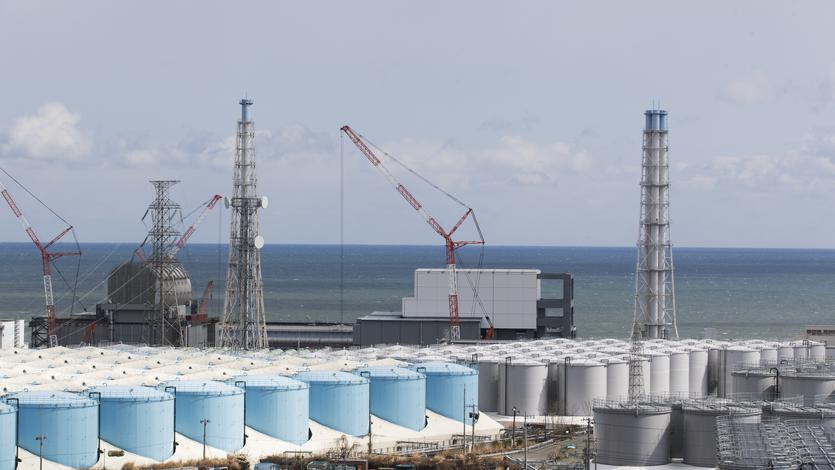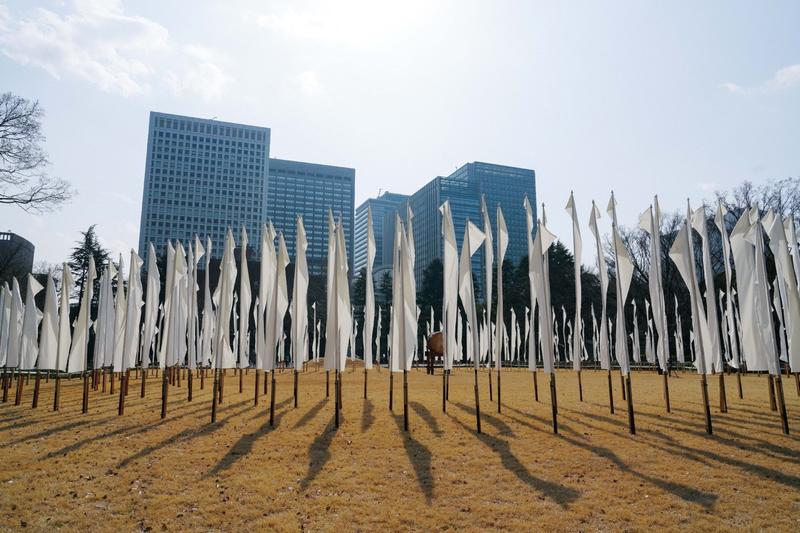 The Pacific Ocean looks over nuclear reactor units of No 3(left) and 4 at the Fukushima Daiichi nuclear power plant in Okuma town, Fukushima prefecture, northeastern Japan on Feb 27, 2021. (HIRO KOMAE / FILE PHOTO / AP)
The Pacific Ocean looks over nuclear reactor units of No 3(left) and 4 at the Fukushima Daiichi nuclear power plant in Okuma town, Fukushima prefecture, northeastern Japan on Feb 27, 2021. (HIRO KOMAE / FILE PHOTO / AP)
TOKYO - A powerful quake that hit northeast of Japan late on Wednesday has revived public concerns over the country's nuclear energy, in a challenge to those who have argued for plants left idle after the 2011 Fukushima disaster to be restarted.
An annual poll by Asahi Newspaper in February showed 47 percent of respondents opposed resuming Japan's nuclear reactors, while 38 percent supported, though that gap has narrowed over the past few years
The 7.4 quake struck shortly before midnight, throwing a swathe of northeastern Japan into darkness, severing key transportation links and killing four. As of Thursday morning, tens of thousands of Japanese households remained without power.
No abnormalities were reported at any nuclear plants, although authorities had earlier said a fire alarm had been triggered at a turbine building at the Fukushima Daiichi plant that was crippled in 2011 earthquake and tsunami.
ALSO READ: 2 killed, 92 injured after 7.4-magnitude quake strikes Japan
On the 11th anniversary of that earthquake, which killed nearly 16,000 people, some ruling party lawmakers urged the government to hasten the restart of nuclear power plants still shuttered because of safety concerns.
Public trust, however, has yet to be fully restored, posing challenges to Prime Minister Fumio Kishida's drive to restart Japan's idle plants.
An annual poll by Asahi Newspaper in February showed 47 percent of respondents opposed resuming Japan's nuclear reactors, while 38 percent supported, though that gap has narrowed over the past few years.
ALSO READ: Ten years after Fukushima, Japan remembers 'man-made' disaster
Tatsujiro Suzuki, a former vice chairman of the Cabinet Office's Atomic Energy Commission, said poor communication with the public remained a problem for Japan compared with efforts by the United States and France.
"There is no good communication channels between the industry, regulators and the local public," Suzuki, a professor at Nagasaki University, told Reuters, calling for a legal scheme to provide mutual communication tools.
 A total of 311 flags are set at the Hibiya Park in Tokyo, Japan, on March 11, 2022 to commemorate the victims of a magnitude-9.0 earthquake and ensuing tsunami that hit Japan's northeast on March 11, 2011. (PHOTO / XINHUA)
A total of 311 flags are set at the Hibiya Park in Tokyo, Japan, on March 11, 2022 to commemorate the victims of a magnitude-9.0 earthquake and ensuing tsunami that hit Japan's northeast on March 11, 2011. (PHOTO / XINHUA)
In the aftermath of 2011, Japan has set stricter safety standards and tightened regulation with an independent overseer of the nuclear energy industry. Tsunami barrier and tide-proof doors are now mandatory, as is protection for backup generators to prevent any reactor core cooling.
Power from nuclear plants slid to almost zero by 2014 in the wake of the Fukushima disaster, but now stands at about 3 percent of total energy production. The government wants to expand that to 20-22 percent by 2030.
Only six reactors are operating now, compared with 54 before the Fukushima disaster. Many others are still going through a re-licensing process under stricter safety standards.
READ MORE: Japan assesses damage after earthquake struck near Fukushima
"Nuclear power plants are not necessarily a stable energy source anymore. If an earthquake happens, there's a risk it has to be shut down," Suzuki said.


